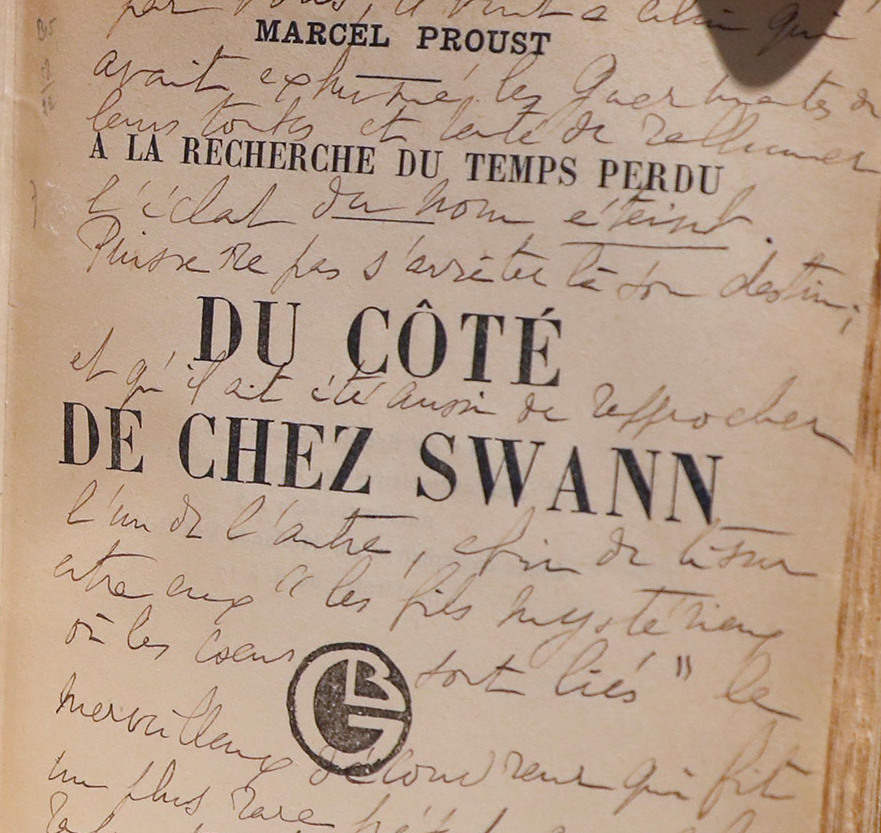Art’s mysterious entity

An orginal edition of Swann’s Way from Proust archives. Photo by Getty
Why art runs in parallel to science as a way of discovering what science can’t plumb, sort of the corrolary of chemical elements in the structure of human subjectivity, the human heart, from Swann’s Way:
When, after that first evening at the Verdurins’, he had had the little phrase played over to him again, and had sought to disentangle from his confused impressions how it was that, like a perfume or a caress, it swept over and enveloped him, he had observed that it was to the closeness of the intervals between the five notes which composed it and to the constant repetition of two of them that was due that impression of a frigid, a contracted sweetness; but in reality he knew that he was basing this conclusion not upon the phrase itself, but merely upon certain equivalents, substituted (for his mind’s convenience) for the mysterious entity of which he had become aware, before ever he knew the Verdurins, at that earlier party, when for the first time he had heard the sonata played. He knew that his memory of the piano falsified still further the perspective in which he saw the music, that the field open to the musician is not a miserable stave of seven notes, but an immeasurable keyboard (still, almost all of it, unknown), on which, here and there only, separated by the gross darkness of its unexplored tracts, some few among the millions of keys, keys of tenderness, of passion, of courage, of serenity, which compose it, each one differing from all the rest as one universe differs from another, have been discovered by certain great artists who do us the service, when they awaken in us the emotion corresponding to the theme which they have found, of shewing us what richness, what variety lies hidden, unknown to us, in that great black impenetrable night, discouraging exploration, of our soul, which we have been content to regard as valueless and waste and void. Vinteuil had been one of those musicians. In his little phrase, albeit it presented to the mind’s eye a clouded surface, there was contained, one felt, a matter so consistent, so explicit, to which the phrase gave so new, so original a force, that those who had once heard it preserved the memory of it in the treasure-chamber of their minds. Swann would repair to it as to a conception of love and happiness, of which at once he knew as well in what respects it was peculiar as he would know of the Princesse de Clèves, or of René, should either of those titles occur to him. Even when he was not thinking of the little phrase, it existed, latent, in his mind, in the same way as certain other conceptions without material equivalent, such as our notions of light, of sound, of perspective, of bodily desire, the rich possessions wherewith our inner temple is diversified and adorned. Perhaps we shall lose them, perhaps they will be obliterated, if we return to nothing in the dust. But so long as we are alive, we can no more bring ourselves to a state in which we shall not have known them than we can with regard to any material object, than we can, for example, doubt the luminosity of a lamp that has just been lighted, in view of the changed aspect of everything in the room, from which has vanished even the memory of the darkness. In that way Vinteuil’s phrase, like some theme, say, in Tristan, which represents to us also a certain accretion of sentiment, has espoused our mortal state, had endued a vesture of humanity that was affecting enough. Its destiny was linked, for the future, with that of the human soul, of which it was one of the special, the most distinctive ornaments. Perhaps it is not-being that is the true state, and all our dream of life is without existence; but, if so, we feel that it must be that these phrases of music, these conceptions which exist in relation to our dream, are nothing either. We shall perish, but we have for our hostages these divine captives who shall follow and share our fate. And death in their company is something less bitter, less inglorious, perhaps even less certain.
Comments are currently closed.